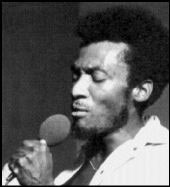ISLAND REVOLUTION: JAMAICAN MUSIC ON FILM
runs Sept. 5-Oct. 3 at EMP
A TINY, DISTANT island nation, Jamaica has had a disproportionate impact on the world musical scene. In celebrating that global influence, Experience Music Project’s fall Island Revolution program reminds us how movies helped transmit Jamaican rhythms and culture to receptive baby boomers from the early ’70s onward. Particularly in the U.S. and U.K., kids responded viscerally to the new (to them) reggae pulse and its charismatic performers. Beginning EMP’s second Music+Film series in conjunction with the Island Revolution show, 1973’s ragged sui generis classic The Harder They Come brilliantly encapsulates the lasting appeal and contradiction of a musical idiom embraced by potheads worldwide.
To see Jimmy Cliff—resplendent in shades, floppy cap, and shirt with foot-long collars—tooling around a golf course in a stolen white convertible isn’t just a giddy coup du cin魡; it’s a political act, the exuberant, devil-may-care defiance of a man kept down all his life and now determined to live his (few) remaining hours to the fullest. Some three decades after its release, Harder now provides an almost documentarylike glimpse into a poor, angry, post-colonial past. Freed from British rule only in 1962, Jamaica was a country looking for homegrown heroes in ’73, and no one—with the possible exception of Bob Marley—better fit the bill than Cliff’s bold, brash character Ivan, a man who’ll claim fame by any means necessary (including murder).
Music is the preferred path to stardom, of course, just as rappers break free of the projects today, but for Ivan and his more congenial counterpart in 1978’s rare Rockers (paired with Harder, 7 p.m. Sept. 5), crime can also pay. “I’m gonna get my share of what’s mine,” Ivan sings in “The Harder They Fall,” Cliff’s timeless, danceable political anthem for the dispossessed. Ivan is driven to sell ganja and kill cops by a corrupt system that permits no entry to a poor country boy. His songs—and the most incendiary aspects of Jamaican music generally—are populist battle cries against “the oppressor.”
That privileged white American college kids and stoners should embrace this Third World sensibility remains an act of cultural misprision. Getting stoned was never the point for Cliff, Marley, or Tosh; getting even was. Demonstrated in EMP’s four subsequent Wednesday night double features, these few musicians profoundly affected faraway bands like the Clash and Jamaican society itself. In the fabulous little JBL Theatre, with its excellent acoustics and perfectly raked seats, to experience these protest songs anew is to hear the sound of history being made.








